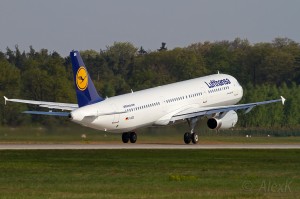
Lufthansa is using this Airbus A321 (D-AIDG) to operate their first scheduled flight using biofuels.
Airlines and airline manufactures have been experimenting with biofuels for quite sometime. It has been successfully shown that airliners are able to fly on biofuel and companies around the globe are working to make sure it is economically feasible and sustainable.
Last week, Lufthansa Airlines started flying an Airbus A321 (D-AIDG) on scheduled service from Hamburg to Frankfurt using a 50/50 mix of regular and biofuel on one of its engines and standard jet fuel in the other.
“The main focus of this test is to examine the effects of biofuel on the lifecycle of the engines and other operational issues,” Martin Riecken, Director Corporate Communications, The Americas explained to AirlineReporter.com. “Two of the main roadblocks are availability of biofuel on a larger scale and the price point. Right now, biofuel is about 60-70 percent more expensive than regular jetfuel.”
The aircraft will operate on the biofuel for a test period of six months. The biofuel is similar enough to jet fuel, that the aircraft needs no additional modifications.
Christoph Franz, Chairman and CEO of the Lufthansa Group, said via a press release: ’œLufthansa is the first airline worldwide to use biofuel in scheduled daily flight operations. We are thus continuing to steadily implement our proven and successful strategy for sustainability.’
The fuel used on the Lufthansa A321 is developed from pure biomass and consists of jatropha, camelina and animal fats. The airline requires that the original product originates from a sustainable supply and is not in direct competition with food production.
When asked if Lufthansa plans to continue to fly with the biofuel Riecken replied, “There are no current plans to continue biofuel operations after the completion of the six-month test phase, but we will continue to support further research efforts.”
By implementing new technologies, Lufthansa has improved their fuel efficiency by over 30 percent since 1991 and on average, their fleet has a fuel consumption of 56 MPG per passenger.
Image: AlexK3800
Hi I read your site everday and really enjoy it. But it’s not true, the engines do need to be modified, the bio will actually eat many types of the (rubber) seals in fuel system. And a 50/50 mix is to rich, and could gel or freeze. Boeing has been running 15% fuel to 85% jet-a
Hey Ron,
Thanks for reading. From Lufthansa’s press release they stated, “…since biokerosene has similar properties to those of conventional kerosene, it can be used for all aircraft types without any need for modifications to the aircraft or its engines.”
I am not sure with this type of fuel and the combination of the Airbus aircraft, that maybe it can be used without any modifications?
David